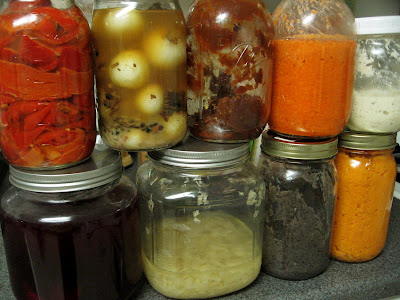
............................My fermented vegetable collection...........................
From left top: Red peppers, pearl onions, ketchup, ginger carrots, coconut chutney
Left bottom: Beet kvass, sauerkraut, black beans, sweet potato
I hated science class from about fifth grade on. I thought it was either irrelevant or disgusting, or both. If I could pull a Billy Madison, I'd go back in a heart beat though. Science fascinates me, and I'd love another chance to participate in a science fair to compare the effects of temperature and time (and music?!) on fermentation. Or something cool like that. But alas, I'll just have to ferment in the kitchen and hope for the best! This week's, and next week's posts most probably, will hopefully bring out the scientist in you. I'm not going to say it's easy, or you can't mess it up - because it's not, and you just may. What I will say is that fermenting foods gives me such satisfaction, that I think it's definitely worth the extra jars and uncertainty lingering around the kitchen.
What IS Fermentation?
Quite simply, it's a chemical change brought about by yeast, bacteria, and/or mold. People have used fermentation for centuries to preserve their food. Many familiar foods are, or were at one time, fermented, including wine and beer, cheese, yogurt, sauerkraut, ketchup (from the Chinese word for fish brine!), and pickles!
Why Should I Ferment?
Let's face it - we spend a good deal of time focusing on our outward appearance. Some more than others, but regardless, I'd bet we all spend more energy on our outward appearance than we do considering what we look like on the inside. Our gut is home to over 200 species of bacteria - microbes help break down the food in our intestines, aiding digestion, fighting off disease (sauerkraut was given to sailors to prevent scurvy), and boosting our immune systems. Maintaining a balance in our intestinal flora is key to our health. If we feed our bodies hard to digest (read: dead and fake) items, fermentation will occur in our bodies, leading to gas, bloating, diarrhea, constipation, and in the long term, possibly diseases and cancer. However, we can also provide our bodies with predigested foods, in the form of fermented goodies, to assist that lovely colony of microbes living under our skin.
Fermentation does more than just preserve food: it increases nutrients, including B vitamins in milk and vitamin C in fermented veggies. It also increases the bioavailability of these vitamins. You may have even heard of some of our microbial friends. Lactobacilli have gained popularity through yogurts like Activia and DanAlive, which both tout the probiotic, or "good bacteria" that the strands of lactobacilli provide. Now, you could just buy a bottle of probiotic pills and be done with it, but you know I'm not going to let you off that easily. The name of this blog is, after all, REAL food. Stay tuned for a post weighing the pros and cons of commercial probiotics, as well as some "How-Tos!"
Fermented Recipes
Coconut Chutney
Kefir
Dosas
Ginger Carrots
Fish Sauce and Ketchup
Beet Kvass
More to come!!
Resources
Wild Fermentation - Includes recipes, FAQs and more!
Fermentation is fun!
Lacto-fermentation



No comments:
Post a Comment